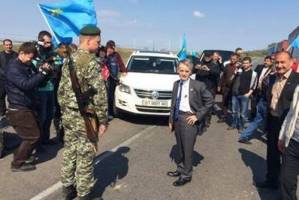Crimean puppet prosecutor uses same ‘Berkut victim’ in ‘May 3’ political trial

The trial is due to begin in Crimea of a 24-year-old man charged in connection with the May 3, 2014 peaceful protest against Russia’s ban on 71-year-old veteran Crimean Tatar leader Mustafa Dzhemiliev entering his homeland. The occupation regime had gone silent over this first ‘case’ which was constantly used as a pretext for armed searches, interrogations and arrests of Crimean Tatars, but have clearly not given it up altogether.
The Crimean Investigative Committee has announced that the 24-year-old from the Krasnogvardeisk region is charged with using violence towards a Berkut special unit officer near the Armyansk border crossing on May 3, 2014. The accused is charged under Article 318 § 2 (applying violence dangerous for health against an official while the latter was carrying out his or her duties).
The report states that the case was initiated by Crimean prosecutor Natalya Poklonskaya “who travelled to the scene of the event to coordinate the action of the law enforcement bodies and as a result of checks of cases of illegal activities issued a resolution regarding organization of criminal prosecution”.
Poklonskaya was installed in her post after Russian soldiers seized control in late Feb 2014, and her involvement may explain why the so-called ‘May 3 case’ is beginning to look suspiciously like at least one other ‘case’ under her personal control. The trial of Maidan activist Oleksandr Kostenko also has a ‘Berkut’ officer as alleged victim, with the injuries in both cases ‘noticed’ either months or almost a year later. Unlike the Kostenko prosecution, however, the events on May 3 did take place in Crimea and under Russian occupation.
On May 3 around 5 thousand Crimean Tatars came to meet Mustafa Dzhemiliev at the Armyansk crossing between the Kherson oblast in mainland Ukraine and the Crimea. The 71-year-old former political prisoner and Ukrainian MP had been stopped from flying to Simferopol the day before, and it seemed clear that the authorities, despite initial denials, were going to impose the extraordinary 5-year-ban on Dzhemiliev entering his native Crimea while under Russian occupation.
Mustafa Dzhemiliev and the Crimean Tatars who came to meet him were confronted by Russian OMON riot police and Crimean ‘police’, including, apparently, ‘Berkut’ special units.
It was decided that Dzhemiliev would return to Kyiv in order to avert bloodshed. The only actual ‘offences’ reported at the time were that roads were blocked.
The following day Poklonskaya sent two reports to the Russian Investigative Committee and FSB “for the organization of criminal prosecution in connection with unlawful public protests” by Crimean Tatars in Armyansk. She also issued Refat Chubarov, head of the Mejlis, or representative assembly of the Crimean Tatars with a warning that the Mejlis could be dissolved, claiming that the protest was “action of an extremist nature”.
A Crimean Human Rights Field Mission spokesperson reported that around 200 people had been fined between 10 and 40 thousand roubles on administrative charges (an ‘unauthorized rally’ and ‘not obeying the police’).
The arrests began six months later, in October over supposed violence against police officers – none of which had been reported at the time. All men were initially remanded in custody for two months. The men arrested included Crimean Tatar activist Tair Smedlyaev who was stopped while driving with his two sons, one of whom was only three and a half, and taken into custody. The judge was reported to have based the detention order on the prosecution’s claim that 60 people had asserted that Smedlyaev was an ‘extremist’. There was apparently also a statement from the Crimean ‘Centre for Countering Extremism’ which claimed that Smedlyaev is also a member of the Ukrainian nationalist organization ‘Right Sector’.
It seemed clear for a long time that the occupation regime was using the so-called ‘May 3 case’ as a Crimean version of the harassment and prosecutions after the Bolotnaya Square anti-Putin protests on May 6, 2012 in Moscow.
Since January this year, however, the regime has move further in repressive measures, this time in connection with preposterous charges over a demonstration that took place on Feb 26, 2014, before Russia’s invasion and annexation. This time five men are being held in custody, including the Deputy Head of the Mejlis, or Crimean Tatar representative assembly, Akhtem Chiygoz.
Halya Coynash





